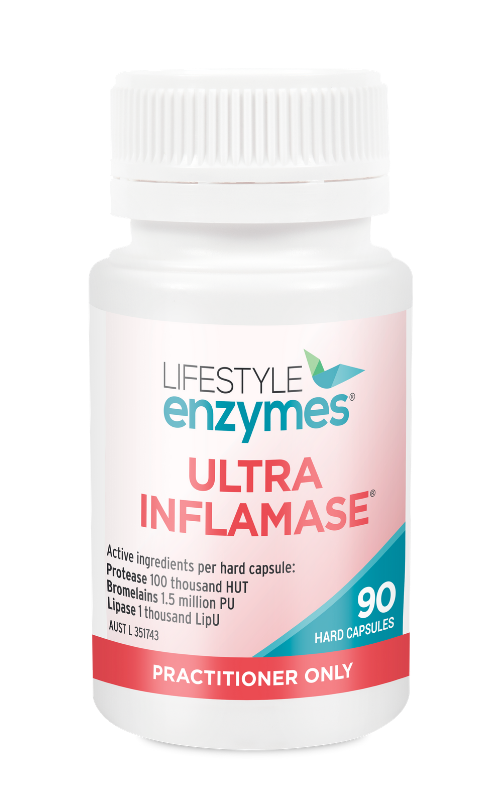
CAN REDUCE PAIN, SWELLING AND INFLAMMATION
Helps activate and regulate inflammation Ultra Inflamase is our proteolytic formula intended for systemic use to help activate and regulate inflammation in the body. This formula can also assist with fat and protein intolerances.
100% vegetarian food enzyme supplement.
Directions for use:
Take one hard capsule with water, three times daily, away from food or as prescribed. (a minimum of one hour prior to a meal or two hours after a meal). If symptoms persist, talk to your health professional.
Ingredients:
Each vegetable capsule contains: Protease (4.5) (from Aspergillus oryzae) 60 thousand HUT Protease (6.0) (from Aspergillus oryzae) 40 thousand HUT Bromelains (from Ananas comosus) 1.5 million PU Lipase (from Rhizopus oryzae) 1 thousand LipU.
No added Gluten, Soy or Dairy.
Available in 90 capsule bottles.
With enzymes, the course of inflammation is not stopped or blocked, but supported and quickened. Using enzyme therapy, pain stops quickly and the duration of inflammation is rapidly diminished. In addition, wounds heal rapidly with reduced scar formation. The following enzymes, as contained in our Ultra Inflamase formula, support this process:
Protease is a key to controlling inflammation. This fungal based blend of proteases (4.5 and 6.0) work to speed up soft tissue repair, as these enzymes have the ability to break down proteins. This has been shown to reduce the amount of fibrin in the damaged capillary, improving circulation and speeding the healing process. Additionally, these same proteases have been known to stimulate phagocytes (cells that ingest foreign particles and debris) and accelerate elimination by way of the lymphatic system. When your cells are injured, they die and become 'foreign' to the body. These dead cells must be removed from the tissue before they can lead to infection. Enzymes in your body degrade and remove these foreign cells. Protease is a classification of a group of enzymes which act on protein molecules and assist in catalysing reactions. These reactions, in effect, help to change the molecular structure, or break down the protein molecules. Based on clinical studies, it is known that proteases are able to dissolve almost all proteins as long as they are not components of living cells. Normal living cells are protected against lysis by the inhibitor mechanism. Viruses, parasites, fungal forms, and bacteria are either protein or protected by protein. The introduction of oral proteases presents the ability of those enzymes to act upon the protein coating of viruses or any protein that is harmful to the body or does not belong. Enzymes can also break down undigested food protein, cellular debris, and toxins in the blood, sparing the immune system this task. The immune system can then concentrate its full action on the bacterial or parasitic invasion.
Bromelains is also a component of this proteolytic blend. It has been extensively studied both in experimental models and clinical studies, for its effects on the inflammatory response. Its main pharmacological effects relate to its ability to significantly reduce the oedema by activating fibrinolysis. The food grade bromelains enzyme used in this formula is a mixture of enzymes isolated from both the ripe and unripe fruit as well as the stem of the pineapple plant, Ananas comosus. Bromelains breaks down proteins to form peptides and amino acids.
Lipase is added to this formula to assist in the hydrolysis of the fat-soluble ingredients in food. This functions to increase the absorption of these vital nutrients. Fat malabsorption is characterised by an abnormal faecal secretion of fat (steatorrhea) which can lead to impaired nutrition by limiting the absorption of essential fats, fat-soluble vitamins, other vitamins, proteins, carbohydrates, minerals, and water. Fat malabsorption may be the result of several factors including inadequate digestive enzymes and bile salt secretion, diarrhoea, infection, and mucosal cell abnormality. Clinically, fat malabsorption is most often associated with pancreatic exocrine deficiency, Crohn's disease, giardiasis, lactose intolerance, and gliadin sensitivity. Indicators of protein and fat intolerance can include cravings for fat, protein and/or salt, bloating immediately after meals, chronic digestive symptoms including constipation, difficulty losing weight, hypoglycaemia (low blood sugar), and gall-bladder disease

